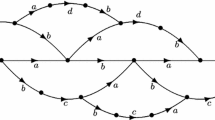Abstract
We investigate the computational complexity of various decision problems related to conjugacy in finite inverse semigroups. We describe deterministic algorithms requiring logarithmic space for checking if two elements are conjugate in the full inverse semigroup with respect to various notions of conjugacy. We prove the following two problems are \(\textsf{PSPACE}\)-complete: given generators for an inverse semigroup, (1) whether the generated semigroup contains a given idempotent and (2) whether two given elements are \(\sim _i\) conjugate in the generated semigroup. We show that checking if an inverse monoid is factorizable is in \(\textsf{NC}\) and is \(\textsf{NL}\)-hard. We prove that the following problems are all \(\textsf{NL}\)-complete: given generators for a partial bijection semigroup, whether the group (1) is nilpotent, (2) is \(\mathrel {\mathcal {R}}\)-trivial, and (3) has central idempotents. We prove that the problem of checking zero membership in a partial bijection semigroup given by generators is \(\textsf{L}\)-complete. We also extend several complexity results for partial bijection semigroups to inverse semigroups.
Similar content being viewed by others
References
Araújo, J., Kinyon, M., Konieczny, J.: Conjugacy in inverse semigroups. J. Algebra 533, 142–173 (2019). https://doi.org/10.1016/j.jalgebra.2019.05.022
Araújo, J., Kinyon, M., Konieczny, J., Malheiro, A.: Four notions of conjugacy for abstract semigroups. Proc. Royal Soc. Edinburgh: Sect. A 147(6), 1169–1214 (2017). https://doi.org/10.1017/S0308210517000099
Araújo, J., Konieczny, J., Malheiro, A.: Conjugation in semigroups. J. Algebra 403, 93–134 (2014). https://doi.org/10.1016/j.jalgebra.2013.12.025
Babai, L., Luks, E., Seress, A.: Permutation groups in NC. In Proc. of the Nineteenth Annual ACM Symposium on Theory of Computing, STOC’87, pp. 409–420, Association for Computing Machinery, New York, NY, USA, (1987). https://doi.org/10.1145/28395.28439
Birget, J.-C., Margolis, S., Meakin, J., Weil, P.: PSPACE-complete problems for subgroups of free groups and inverse finite automata. Theor. Comput. Sci. 242(1), 247–281 (1994). https://doi.org/10.1016/S0304-3975(98)00225-4
Clifford, A.H., Preston, G.B.: The Algebraic Theory of Semigroups. Vol. I. Mathematical Surveys, No. 7. American Mathematical Society, Providence, RI (1961)
Cook, S.A., McKenzie, P.: Problems complete for deterministic logarithmic space. J. Algorithms 8(3), 385–394 (1987). https://doi.org/10.1016/0196-6774(87)90018-6
Fleischer, L., Jack, T.: The complexity of properties of transformation semigroups. Internat. J. Algebra Comput. 30(3), 585–606 (2020). https://doi.org/10.1142/S0218196720500125
Howie, J.M.: Fundamentals of Semigroup Theory, London Mathematical Society Monographs. New Series, vol. 12. Oxford University Press, Oxford (1995)
Immerman, N.: Descriptive Complexity. Texts in Computer Science. Springer, New York, NY (1999). https://doi.org/10.1007/978-1-4612-0539-5
Izhakian, Z., Rhodes, J., Steinberg, B.: Representation theory of finite semigroups over semirings. J. Algebra 336, 139–157 (2011). https://doi.org/10.1016/j.jalgebra.2011.02.048
Jack, T.: The complexity of properties of partial bijection semigroups. Preprint (2021). arXiv:2101.00324
Kudryavtseva, G., Mazorchuk, V.: On the conjugation in some transformation and Brauer-type semigroups. Publ. Math. Debrecen 70(1–2), 19–43 (2007). https://doi.org/10.5486/PMD.2006.3354
McKenzie, P., Cook, S.A.: The parallel complexity of the abelian permutation group membership problem. In 24th Annual Symposium on Foundations of Computer Science, pp. 154–163 (1983). https://doi.org/10.1109/SFCS.1983.74
Papadimitriou, C.H.: Computational Complexity. Addison-Wesley Publishing Company, Reading, MA (1994)
Reingold, O.: Undirected connectivity in log-space. J. ACM 55(4), 1–24 (2008). https://doi.org/10.1145/1391289.1391291
Acknowledgements
The author would like to thank Alan Cain, António Malheiro, and Peter Mayr for their valuable comments and contributions. The author would also like to thank the referee for their significant contributions to the results and quality of this paper.
Funding
This work was partially supported by the Fundação para a Ciência e a Tecnologia (Portuguese Foundation for Science and Technology) through the projects UIDB/00297/2020 (Centro de Matemática e Aplicações) and PTDC/MAT-PUR/31174/2017.
Author information
Authors and Affiliations
Corresponding author
Additional information
Communicated by Mikhail Volkov.
Publisher's Note
Springer Nature remains neutral with regard to jurisdictional claims in published maps and institutional affiliations.
Rights and permissions
Springer Nature or its licensor (e.g. a society or other partner) holds exclusive rights to this article under a publishing agreement with the author(s) or other rightsholder(s); author self-archiving of the accepted manuscript version of this article is solely governed by the terms of such publishing agreement and applicable law.
About this article
Cite this article
Jack, T. On the complexity of inverse semigroup conjugacy. Semigroup Forum 106, 618–632 (2023). https://doi.org/10.1007/s00233-023-10349-y
Received:
Accepted:
Published:
Issue Date:
DOI: https://doi.org/10.1007/s00233-023-10349-y




